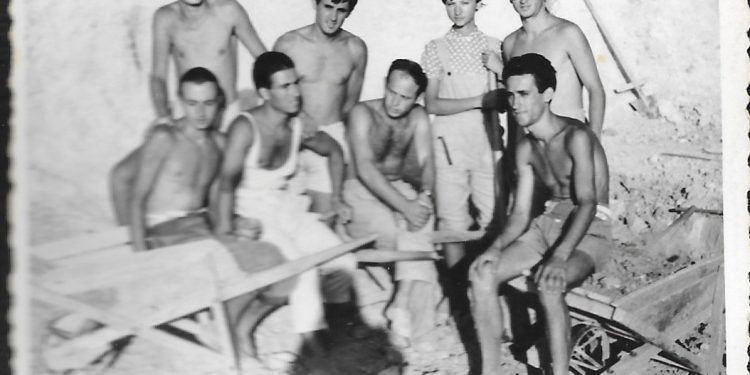
Prof. Dr. Albert Frashëri
The loss of man, his death, is an irreversible event that often invites us to meditate on the true meaning of life. Over the years we have had many such cases, but not all of them make us think about what is good and what is bad in this spontaneous transition, in the blink of an eye, which is called life. Some of them leave indelible marks on the messages that their life has expressed. One of these rare people was our friend Nevruz Çela, who passed away at the beginning of this fragile November, troubled by the pandemic of an insidious virus. His life, from an essential point of view, is a monument to a constellation of people who suffered, remained physically submissive, but without alienating what was precious in their existence: moral integrity, worldview of life and society. Physical suffering failed to change their character, clarity, and ideas about life and society.
The life of Nevruz Çela miraculously synthesizes an experience that deserves the attention of those, as well as me, who have experienced with Nevruz the good and the bad. But none of his friends suffered that totalitarian regime to the extent that our friend knew … but despite this he remained pure ice, sober and patient like no one.
Nevruz Çela was born in August 1945, to two well-educated parents who loved democracy. His father, Beqir Çela, was arrested along with a group of MPs who raised their voices about the dangers that were threatening democracy. They were all shot in 1947. His mother, Ervehe, and sister, Mimika, along with Nevruz remained in a mournful state: our mother, an extraordinary noble woman, lost her job as a teacher and ended up in heavy manual labor until how he retired in the ’70s. Nevruzi was one of the most distinguished high school students in Durrës. Some of them came to the Faculty of Natural Sciences, in the branch of mathematics. At that time all students of mathematics and physics received a sufficient scholarship to afford the studies. But some of them remained with their finger in their mouth. Nevruz and a few others were not given scholarships. I do not know, he told me with painful sincerity, if I could continue. His mother, on the contrary, persuaded him not to devote himself to studies.
Four years with the great sacrifices of his mother, Vuçi, as we call his friends, ended with complete success and graduated in May 1967. In those years he fell in love with our friend, a student in mathematics as well as us., Vera Juka. A forbidden love like those little Migjen’s Little Flower apples. But they both overcame those difficulties with the reason of the love that united them. The completion of the studies brought bitter surprises to Nevruz and Vera, who were waiting to start a life together between work and family. The surprise was so bitter for both: Nevruz was excluded from the right to practice the teaching profession. Teaching summer while mechanical Nevruz in a factory in Durrës, a physically difficult job with heavy machinery, which he faced with dignity for 22 years. They formed a family that deserved the respect of friends and the whole city. That family was an expression not only of the Juka and Çela families, but especially of the personal virtues that characterized that couple. Their three children successfully completed their higher education and today work in Albania, France and Austria. Everything good Vera and Nevruz had, talents and moral integrity, they inherited from their children. This, perhaps, remains the noblest achievement of the life of that couple who lived in mutual love for almost 55 years. A rare case of human coherence, affection and virtue.
In those years Nevruz did not lose interest in continuous reading and did not share the hope that one day that regime would collapse. And so, it happened: a rotten regime that, without putting its hand on anyone from outside, self-destructed with shame.
In the 1992 elections, Durrës elected him as Mayor and later he became a member of the People’s Assembly. This new situation, he told me, has created great difficulties for me: I have to close my eyes to actions that, from a political and social point of view, I do not accept or give up the active life of the parties. Many political mistakes of those years brought about the bitter and dramatic events of 1997. This was one of the convictions of Nevruz, the man who had known the cruelty of a totalitarian regime, but also the absurd and wrong walks of the post-political class. 90s. Today politics, Nevruz told me, claims to create a democratic reality with methods that do not shine for dialogue skills or mutual respect between the many parties. The parties, it was his conviction, let them have differences, but if they do not have common ideas about the basic problems of the nation, they cannot lead the state towards its future.
In those first ten years of a democracy with continuous and strange zigzags, Nevruz Çela has been one of the most important figures of that new democracy that the citizens of Durrës supported and since then they were disappointed. In one way or another, the Democratic Party removed from its ranks patriotic people with high moral integrity like Nevruz Çela or Dr. Isan Çabej. Such figures express the most noble appearance of our nation. The leaders of the ‘90s continue to vegetate on horseback, as had happened with Enver Hoxha’s officials. Nevruz disappointment was a significant expression of the pessimism of all Albanians.
It is not easy to find human figures who, with their lives, testify to the cruelty of communist totalitarianism and, on the other hand, also express with personal experience an almost compromised democratization that is unlikely to achieve what constitutes the ideal. of the nation. This is a difficult statement, but the truth requires us to accept it.
The human essence and the democratic thread of Nevruz Çela’s ideas were not alienated from the violence of communism, nor were they lied to with these democratization efforts that do not warm the hearts of Albanians. Today, Nevruz told me, the need for dialogue, the dialectic of ideas in the politics and economy of the country, have given way to quarrels without blessings between the parties and their leaders. Nevruz Çela desperately needed to see a horizon of light, a hope for the future of the nation and the revival of its human potentials. He, surely, has taken with him this disappointment that he entrusted only to his closest friends. I think that this figure of a balanced and honest man, capable of the family next to his friend, Vera Juka, useful for society and a model of simplicity, constitutes an ideal of the citizen of a democratic reality that this ancient nation would deserve./Memorie.al











